The Old Testament Library Series (7 vols.)
Digital Logos Edition
Overview
This seven-volume series of The Old Testament Library offers powerful commentary, exegesis, and literary insight into some of the most critical writings in the Old Testament. The series covers Judges, I & II Samuel, I & II Kings, Song of Songs, Isaiah, Jeremiah, and Micah. Biblical scholars including A. Graeme Auld, Marvin A. Sweeney, and J. Cheryl Exum bring fresh understanding to these well-known passages, from the often neglected book of Micah to the sweeping historical narrative of Kings. Deepen your appreciation for the poetry in Jeremiah and the Song of Songs. Be inspired by the theology of Isaiah. Get to know David as he appears in Samuel. With over 3,000 pages of rich scholarship, The Old Testament Library Series (OTL) is worthy of a prominent place in any modern biblical scholar’s library.
With Logos Bible Software, these valuable volumes are enhanced by cutting-edge research tools. Scripture citations appear on mouseover in your preferred English translation. Important terms link to dictionaries, encyclopedias, and a wealth of other resources in your digital library. Powerful topical searches help you find exactly what you’re looking for. Tablet and mobile apps let you take the discussion with you. With Logos Bible Software, the most efficient and comprehensive research tools are in one place, so you get the most out of your study.
This title is included in the following collections
You can save when you purchase this product as part of a collection.
Logos 8 Methodist & Wesleyan P...
$1,499.99$1,499.99Logos 7 Methodist & Wesleyan P...
$1,499.99$1,499.99The Old and New Testament Libr...
$2,072.35$1,649.992025 Researcher Diamond Librar...
$2,999.99$2,249.99
- $2,999.99$2,249.99
- $2,999.99$2,249.99
- $3,149.99$2,362.49
- $2,999.99
- $2,999.99
- $2,999.99
- $2,999.99
- $2,999.99
- $2,999.99
- $2,999.99
- $2,999.99
- $3,999.99$2,999.99
- $2,999.99
- $3,999.99$3,399.99
- $4,749.99$3,562.49
- $4,899.99$3,674.99
- $5,999.99$4,499.99
- $5,999.99$4,499.99
- $4,749.99
- $4,749.99
- $4,749.99
- $4,749.99
- $4,749.99
- $4,749.99
- $4,749.99
- $4,749.99
- $4,749.99
- $6,399.99$4,799.99
- $10,999.99$8,249.99
- $11,399.99
- $11,399.99
- $11,399.99
- $23,999.99$17,999.99
- $21,749.99
- $24,999.99

- Observations by some of today’s leading biblical scholars
- Fresh insights into well-known Old Testament books
- Relevant commentary, exegesis, and literary criticism for today’s Christian
This series provides an extraordinary service to biblical scholarship.
—Reviews in Religion & Theology
Belongs on the shelves of students, clergy, and professional scholars as well as the serious layperson.
—Journal of Biblical Theology
- Title: The Old Testament Library
- Series: The Old Testament Library Series (OTL)
- Publisher: Westminster John Knox
- Volumes: 7
- Pages: 3,143
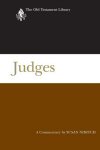
Susan Niditch’s commentary on the book of Judges pays careful attention to the literary and narrative techniques of the text and yields fresh readings of the book’s difficult passages: stories of violence, ethnic conflict, and gender issues. Niditch aptly and richly conveys the theological impact and enduring significance of these stories.
Susan Niditch is Samuel Green Professor of Religion at Amherst College. She is the author of many books, including Oral World and Written Word: Ancient Israelite Literature in the acclaimed Library of Ancient Israel, published by Westminster John Knox Press.
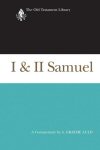
In this new addition to the Old Testament Library series, A. Graeme Auld writes, “This book is about David.” The author demonstrates how all the other personalities in First and Second Samuel—including Samuel, for whom the books were named—are present so that we may see and know David better. These fascinating stories detail the lives of David, his predecessors, and their families. Auld explains that though we read these books from beginning to end, we need to understand that they were composed from the end to the beginning. By reconstructing what must have gone before, the story of David sets up and explains the succeeding story of monarchy in Israel.
A. Graeme Auld is professor emeritus of Hebrew Bible at the University of Edinburgh, Scotland.
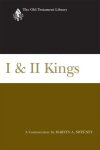
This volume offers a close reading of the historical books of First and Second Kings, concentrating on not only issues in the history of Israel but also the literary techniques of storytelling used in these books. Marvin A. Sweeney provides a major contribution to the prominent Old Testament Library series with advanced discussions of textual difficulties in the books of Kings as well as compelling narrative interpretations.
Marvin A. Sweeney is professor of Hebrew Bible at Claremont School of Theology and professor of religion at Claremont Graduate University.
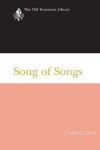
This original commentary highlights the poetic genius of the Song of Songs, one of the most elusive texts of the Hebrew Bible. J. Cheryl Exum illustrates that genius in the way the song demonstrates to its readers that love is as strong as death. She shows how the song immortalizes love, offering a mature sensitivity to how being in love is different for the woman and the man. Many long-standing conundrums in the interpretation of the book are given persuasive solutions in Exum’s verse-by-verse exegesis.
J. Cheryl Exum is professor of biblical studies at the University of Sheffield. The author of numerous scholarly works on the Hebrew Bible, her books include Tragedy and Biblical Narrative, Fragmented Women: Feminist (Sub)versions of Biblical Narratives as well as Plotted, Shot, and Painted: Cultural Representations of Biblical Women. She is executive editor of the journal Biblical Interpretation and a director of Sheffield Phoenix Press.
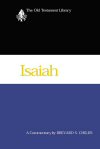
In this important addition to the Old Testament Library, renowned scholar Brevard S. Childs writes on the Old Testament’s most important theological book. He furnishes a fresh translation from the Hebrew and discusses questions of text, philology, historical background, and literary architecture, and then proceeds with a critically informed, theological interpretation of the text.
Brevard S. Childs is Sterling Professor of Divinity and fellow of Davenport College, The Divinity School, Yale University, and author of Biblical Theology in Crisis and The Book of Exodus (Old Testament Library), both from Westminster John Knox Press.
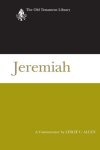
This book of Jeremiah offers a remarkable range of literature, including prose, poetry, homilies, oracles, and proverbs. This commentary understands the book as a work of religious literature, to be examined in its final form, yet with careful attention to the historical contexts of writing and development through which the text took shape. Jeremiah proclaimed a message of coming judgment, because of the people's unfaithful worship, and yet also emphasized the call to know Yahweh and to live as God’s faithful people. Through it all, Leslie C. Allen identifies a trajectory of grace, in which the proclamations of doom can be understood within the context of promises for a renewed future.
Leslie C. Allen is a senior professor of Old Testament at Fuller Theological Seminary in Pasadena, California. He has also written commentaries on Psalms and Ezekiel for the Word Biblical Commentary and on Chronicles for The New Interpreter’s Bible.
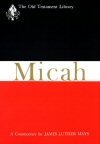
This much-needed commentary provides an authoritative guide to a better understanding of the often-neglected book of Micah. It gives insight into the individual sayings of Micah, to the way they were understood and used as they were gathered into the growing collection, and to their role in the final form of the document. “I am convinced,” says James L. Mays, that Micah “is not just a collection of prophetic sayings, but is the outcome of a history of prophetic proclamations and is itself, in its final form, prophecy.”
James L. Mays is Cyrus M. McCormick Professor Emeritus of Hebrew and Old Testament Interpretation at Union Theological Seminary in Richmond, Virginia.
Reviews
5 ratings

Jason Egbert
2/5/2017


David Luffy
2/8/2016
Any updates from Logos regarding missing volumes, particularly Exodus from Brevard Childs??
Unix
1/12/2016

Ian Carmichael
6/19/2015
And the quiet of the sellers is unsurprising, but disappointing. C'mon Faithlife. The OTL series is substantial. This offering is insubstantial. Are you being slow, are WJK being tardy? I'd like to consider the major part of the series, and its availability in Logos format so it's integrated with that search engine and datasets available in it - but there's a limit to waiting, and the value of a premium pricing can be eclipsed.Neil Parker
1/15/2015
I'm sure more are forthcoming, since these are now available in Kindle versions through Amazon and Christian Book Distributors, including the classics mentioned by people above. What will determine my decision -- to order now or to wait -- will depend on Logos' plans. When will more or all volumes be available, and will there be special pricing? (Kindle volumes through Amazon are roughly $50 less for these seven volumes).
Mathew Voth
7/28/2014
It would be great if someone from Logos would fill us in on the missing volumes...

Peter Keay
7/17/2014
The most important volumes from OTL (Exodus, Lamentations, Chronicles, Nahum) are missing :( Are these in the works?